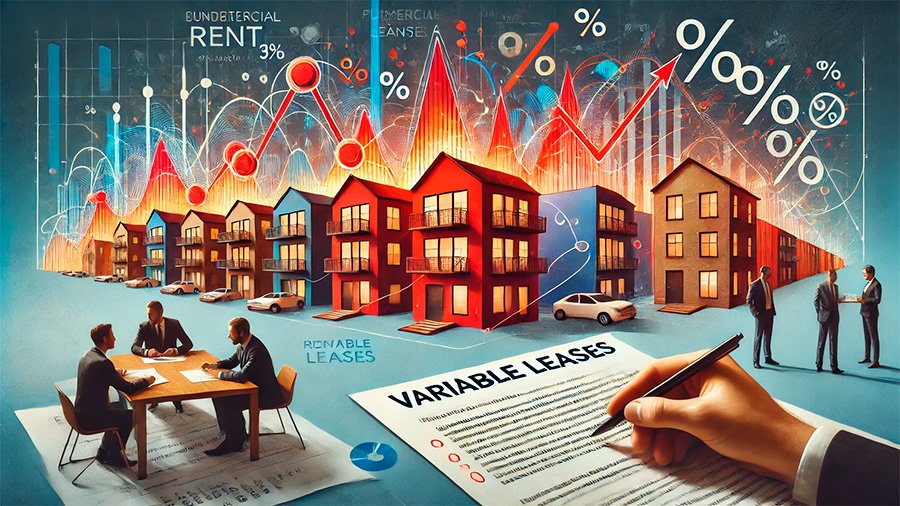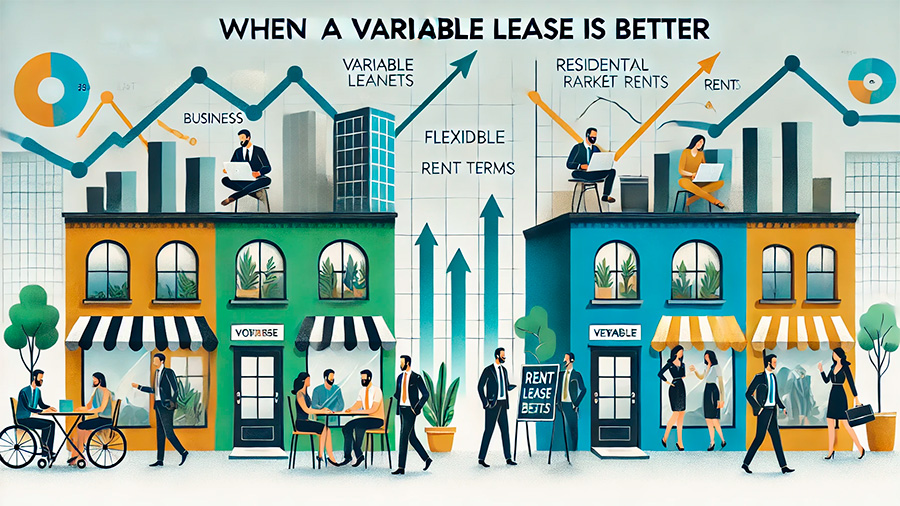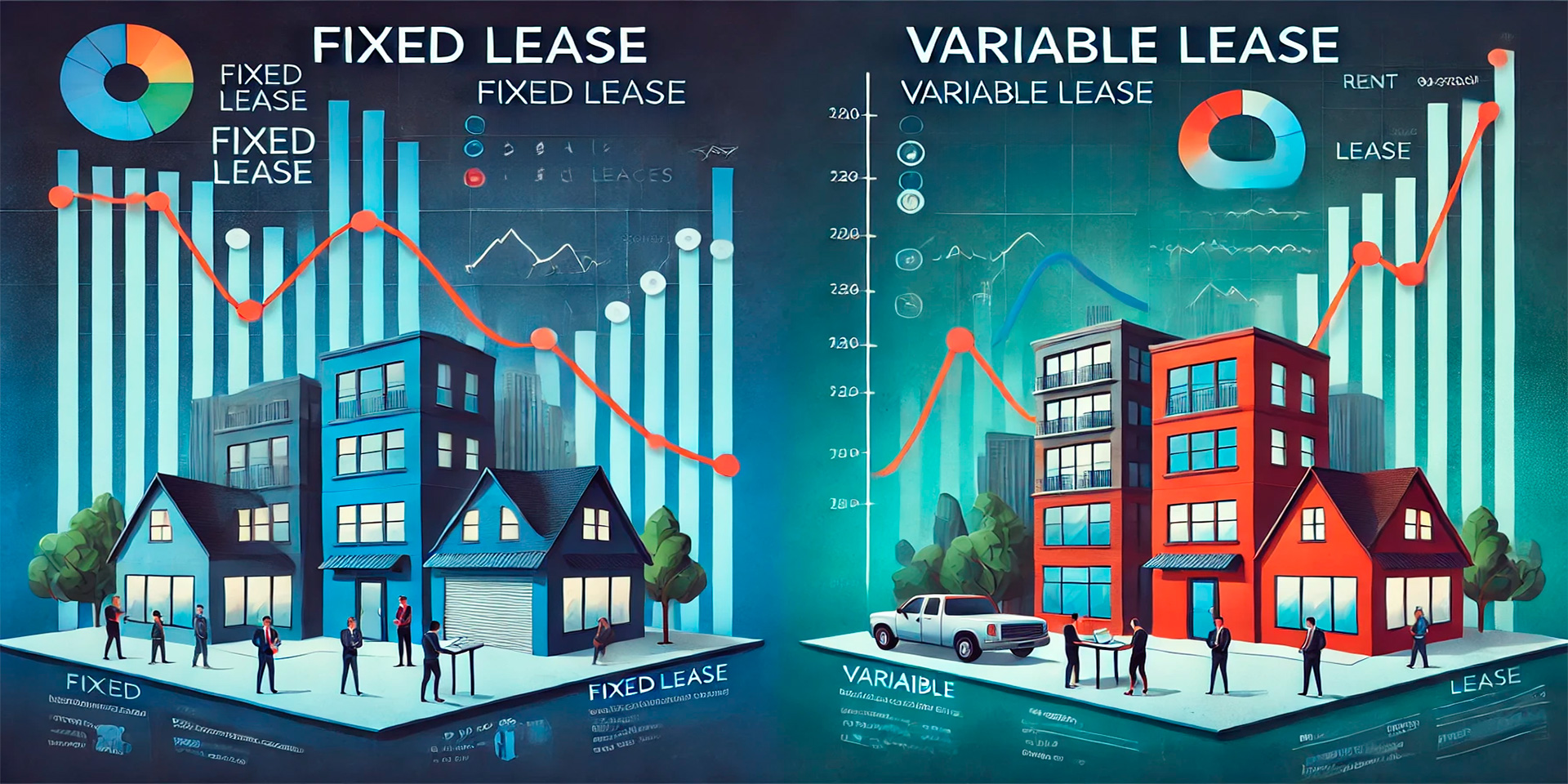When leasing a commercial or residential property, one of the most important decisions you’ll face is whether to opt for a fixed lease or a variable lease. Both types of leases offer distinct advantages and disadvantages, and understanding the differences can help you determine which is best suited to your financial and operational needs. In this article, we’ll break down the key features of fixed and variable leases and provide insights into which option may work best for you as a tenant.
Understanding Fixed Leases
A fixed lease is a rental agreement in which the tenant pays a set amount of rent for a predetermined period, typically ranging from one to several years. The key feature of a fixed lease is that the rent remains constant throughout the lease term, providing stability and predictability for tenants.
Advantages of Fixed Leases
One of the most appealing aspects of a fixed lease is the financial certainty it offers. Tenants know exactly how much they will be paying each month, which helps with budgeting and long-term financial planning.
- Predictable Costs: With a fixed lease, you are protected from unexpected rent increases during the lease term. This can be especially beneficial in markets where rent prices are rising rapidly. Knowing your rent will stay the same allows you to plan your expenses without worrying about sudden changes.
- Stability for Long-Term Tenants: Fixed leases are ideal for tenants who plan to stay in the same location for an extended period. If you’re running a business, this stability allows you to focus on growth and operations rather than constantly renegotiating lease terms.
- Protection Against Market Fluctuations: Fixed leases can be advantageous in times of inflation or when market rents are increasing. By locking in a lower rate, tenants can avoid the rising costs of rental properties and maintain a more affordable space.
Disadvantages of Fixed Leases
While fixed leases provide stability, they also come with some drawbacks, particularly in terms of flexibility.
- Limited Flexibility: Once a fixed lease is signed, you are committed to the terms for the duration of the agreement. If your needs change—whether it’s downsizing, expanding, or relocating—you may find it difficult to modify the lease without incurring penalties or breaking the contract.
- Potential for Overpaying: In a declining rental market, fixed lease tenants may end up paying more than the current market rate for similar properties. Since the rent is locked in, tenants miss out on potential savings if the overall rental market softens.

Understanding Variable Leases
A variable lease, also known as a flexible or floating lease, allows the rent to fluctuate based on certain factors such as market conditions, inflation, or other predetermined variables. Unlike fixed leases, the rent in a variable lease may change throughout the lease term.
Advantages of Variable Leases
Variable leases offer tenants more flexibility and the opportunity to benefit from favorable market conditions.
- Flexibility: One of the key benefits of a variable lease is that it can adjust to the tenant’s changing needs. In some cases, tenants can negotiate shorter terms or have the ability to renegotiate rent periodically. This flexibility can be especially useful for growing businesses or individuals who anticipate changes in their space requirements.
- Potential for Lower Costs: In a soft rental market, tenants with variable leases may be able to take advantage of falling rents. This can result in lower payments during periods of economic downturn, allowing tenants to save money compared to those locked into higher fixed-rate leases.
- Negotiation Opportunities: Variable leases often come with built-in periods where terms can be renegotiated. If your business experiences growth or market conditions improve, you may have the opportunity to adjust your lease terms to better fit your needs or budget.
Disadvantages of Variable Leases
While variable leases provide flexibility, they also carry risks that can lead to financial uncertainty for tenants.
- Unpredictable Rent Increases: One of the major drawbacks of a variable lease is the potential for rent increases. If the market strengthens or inflation rises, tenants may see their rent go up during the lease term. This unpredictability can make it difficult to plan finances and may lead to budget strain if rent rises significantly.
- Less Stability: For tenants who prefer a stable, long-term arrangement, variable leases may feel too uncertain. The potential for rent fluctuations, combined with shorter lease terms, can create instability, especially for businesses that rely on cost predictability for long-term financial planning.
- Complex Terms: Variable leases often come with complex terms that may require more detailed negotiation and understanding. For example, rent may be tied to inflation rates, property taxes, or market indices, which means tenants need to be well-versed in how these factors can impact their rent.
When a Fixed Lease Is Better
A fixed lease is often the better choice for tenants who value stability and predictability. If you are looking for a long-term space and prefer to lock in a consistent rent rate, a fixed lease provides peace of mind and shields you from market fluctuations.
Ideal for Long-Term Tenants
Businesses or individuals planning to stay in the same location for several years will benefit most from a fixed lease. The consistent rent payments help with long-term budgeting and prevent the stress of negotiating new terms frequently. For businesses with stable revenue or individuals with fixed incomes, the predictability of a fixed lease makes financial planning much easier.
Best in a Rising Rental Market
In markets where rents are steadily increasing, a fixed lease can help tenants avoid paying more as rates climb. Locking in a lower rent at the beginning of a lease term protects you from the financial impact of a rising rental market, allowing you to enjoy your space at a predictable and potentially below-market rate.

When a Variable Lease Is Better
A variable lease may be the better option for tenants who prioritize flexibility and want the potential to benefit from market changes. This type of lease is ideal for businesses or individuals with fluctuating space needs or those looking to capitalize on declining rental markets.
Ideal for Short-Term or Growing Businesses
For businesses that anticipate rapid growth or changes in space requirements, a variable lease can offer the flexibility needed to adjust quickly. Shorter lease terms and the ability to renegotiate rents allow for more adaptability. Additionally, startups or businesses testing new locations may find variable leases advantageous, as they provide the flexibility to relocate or expand without being locked into a long-term contract.
Best in a Declining or Uncertain Market
In a declining rental market, where rents are expected to fall or remain stagnant, a variable lease can result in lower monthly payments over time. This allows tenants to capitalize on more favorable market conditions and avoid paying more than necessary for their space. For those who want to take advantage of potential savings, a variable lease offers the opportunity to adjust rent in line with market trends.
Key Considerations When Choosing Between Fixed and Variable Leases
When deciding between a fixed or variable lease, it’s important to assess your specific needs and priorities. Both types of leases have advantages depending on your goals and financial situation.
Budget Stability vs. Flexibility
If you value stability and predictable costs, a fixed lease is likely the better option. However, if flexibility and the ability to adapt to changing circumstances are more important, a variable lease offers more room for adjustments.
Market Conditions
Understanding the rental market in your area is key to making the right choice. In a hot market with rising rents, a fixed lease can protect you from price hikes, while in a declining market, a variable lease could help you save money.
Long-Term vs. Short-Term Needs
Consider whether you plan to stay in the space long-term or if your needs may change. For long-term tenants, the stability of a fixed lease may be appealing, while short-term or growing businesses may prefer the flexibility of a variable lease.
Conclusion: Which Lease is Right for You?
Deciding between a fixed lease and a variable lease depends on your individual circumstances and priorities. If stability, predictable costs, and long-term planning are your top concerns, a fixed lease will likely serve you best. On the other hand, if flexibility, short-term adaptability, and the potential to capitalize on market trends are more important, a variable lease may be the ideal choice. By carefully weighing the pros and cons of each option and considering your financial and operational needs, you can make an informed decision that benefits you in the long run.





